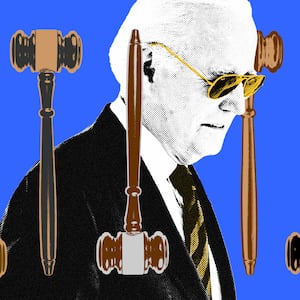Secretary of Homeland Security Alejandro Mayorkas has been denounced as dishonest, duplicitous, and derelict by his critics. In my view, all of those things are manifestly true. It is also true, in my opinion, that none of those things amount to high crimes and misdemeanors warranting his impeachment.
The Republican push to impeach Mayorkas has been gaining steam as record numbers of undocumented migrants pour over our Southern border. Even many Democrats are now alarmed by the numbers and the threat that they pose to our national security and to our economy. Sanctuary cities from Chicago to New York are actively trying to prevent new migrants from seeking sanctuary within their own borders.
At the center of all of this is Mayorkas, who has long been viewed as an enabling figure for illegal migrations. He is also accused of implementing Biden policy changes that removed barriers to migrants, including rescinding the “Stay in Mexico” rule.
Some of us have also questioned his integrity)" href="https://urldefense.com/v3/__https://jonathanturley.org/2023/12/01/love-is-never-having-to-say-youre-sorry-mayorkas-meets-refuses-to-apologize-to-del-rio-agents/__;!!LsXw!S3tUPs3k5jbJsI3r0aEKC-KQLhEMc-oq6KqSl6G1SlW111PdCeioqJuQAHXQuuh_TRNJkX__QLBLFDlgU8jifdh_GbDjTg$">questioned his integrity, particularly in controversies like the false claims that border agents whipped migrants in Texas.
Mayorkas knew)" href="https://urldefense.com/v3/__https://jonathanturley.org/2022/10/12/something-that-horrified-us-all-new-evidence-shows-mayorkas-was-warned-that-migrant-whipping-story-was-false/__;!!LsXw!S3tUPs3k5jbJsI3r0aEKC-KQLhEMc-oq6KqSl6G1SlW111PdCeioqJuQAHXQuuh_TRNJkX__QLBLFDlgU8jifdi5zucgvA$">Mayorkas knew the allegations against his own personnel were debunked, but showed little concern or compassion for agents, particularly after President Joe Biden promised)" href="https://urldefense.com/v3/__https://jonathanturley.org/2022/03/28/bidens-red-queen-justice-the-border-agents-remain-under-investigation-six-months-after-debunked-whipping-scandal/__;!!LsXw!S3tUPs3k5jbJsI3r0aEKC-KQLhEMc-oq6KqSl6G1SlW111PdCeioqJuQAHXQuuh_TRNJkX__QLBLFDlgU8jifdiFnw3HPQ$">promised they would be punished before any investigation had even begun.
However, being a bad person is not impeachable—or many cabinets would be largely empty.

Alejandro Mayorkas, Secretary of Homeland Security
Pool/GettyMoreover, being bad at your job is not an impeachable offense. Even really bad. Even Mayorkas’ level of bad. If that were the case, he would be only the latest in a long line of cabinet officers frog-marched into Congress for constitutional termination.
In history, there has only been one cabinet member impeached. That was Secretary of War William Belknap in 1876)" href="https://urldefense.com/v3/__https://jonathanturley.org/2021/01/14/for-a-senate-trump-trial-think-belknap-not-blount/__;!!LsXw!S3tUPs3k5jbJsI3r0aEKC-KQLhEMc-oq6KqSl6G1SlW111PdCeioqJuQAHXQuuh_TRNJkX__QLBLFDlgU8jifdh9XZGBhQ$">William Belknap in 1876. That alone should concentrate the mind of members. Despite decades of controversial cabinet members accused of flaunting the law or abusing their positions, Congress has only crossed this Rubicon once. There has existed a certain detente between the parties; an understanding that policy-based impeachments could open up endless tit-for-tat impeachment politics.
The charges against Belknap were serious, in that he had allegedly “disregarded his duty as Secretary of War, and basely prostituted his high office to his lust for private gain.” The alleged bribes in contracts in the Indian territories would have constituted impeachable offenses, but Belknap had already left office. His case raised the question of retroactive impeachments for former federal officers.
The jurisdictional concerns made the difference for Belknap. The final vote on the closest article was 37 to 25 in favor of impeachment—four votes short of the number needed for conviction.
There is no jurisdictional question for Mayorkas, but there is also no current evidence that he is corrupt or committed an impeachable offense. He can be legitimately accused of effectuating an open border policy, but that is a disagreement on policy that is traced to the President.
In fairness to the GOP, they allege that Mayorkas is violating federal law in releasing what he now reportedly)" href="https://urldefense.com/v3/__https://news.yahoo.com/mayorkas-tells-border-patrol-agents-215343263.html__;!!LsXw!TfCT64QbYa_hdDKK-2mBfBqKedXOEEfhTTVg-KDvTi0f_XxkawtfYRx132eEncq3c6A8kiZYfhhzTT6irpUFtWORwuamQw$">reportedly admits is over 85 percent of illegal migrants into the country as well as alleged false statements to Congress. Such releases, however, occurred in prior administrations and the merits of these claims are still being argued in court.
The courts have long recognized that presidents are allowed to establish priorities in the enforcement of federal laws, even when those priorities tend to lower enforcement for certain groups or areas. It is a matter of discretion.
Indeed, even under the Federal Tort Claims Act (FTCA) which holds the government liable for civil damages, there is a discretionary function exception codified under 28 U.S.C. § 2680(a) for policy-based judgments.
Immigration has long been an area of intense policy disagreements. Trump policies were denounced by critics as draconian or even racist. Biden's policies have been denounced as fueling illegal crossings and frustrating efforts to curtail the flow, particularly by border states.

U.S. Department of Homeland Security Secretary Alejandro Mayorkas speaks on May 5, 2023 in Brownsville, Texas.
Michael Gonzalez/GettyIn my view, Biden has been dead wrong on immigration, but voters will soon have an opportunity to render a judgment on those policies in the election. Mayorkas has carried out those policies. What has not been shown is conduct by the secretary that could be viewed as criminal or impeachable.
If Mayorkas is violating federal law, he can be brought to court to enjoin his actions. A prior case seeking to prevent the termination of the “Stay in Mexico” policy resulted in a win for the Biden administration in Biden v. Texas, when the Supreme Court ruled the president had the authority to revoke the Migrant Protection Protocols.
During the Constitutional Convention, there was a debate over the grounds for impeachment with George Mason arguing for a broad scope of offenses that could “subvert the Constitution.” His view was rejected. Most notably, there was a rejection of “maladministration” as a basis for impeachment.
An English trial of Warren Hastings weighed heavily on the forging of the impeachment standard. The former governor of India was charged with various offenses including “mismanagement and misgovernment... and mistreatment of various provinces.” While figures like Mason saw the need for the adoption of a similarly broad definition, his suggestion of maladministration was rejected as too broad.
What Mayorkas is guilty of is maladministration. He has failed to secure the Southern border and has long denied the gravity of this crisis, including refusing to call it a crisis even as daily)" href="https://urldefense.com/v3/__https://www.foxnews.com/politics/southern-border-record-number-migrant-encounters-single-day-thousands-flood-into-texas__;!!LsXw!S3tUPs3k5jbJsI3r0aEKC-KQLhEMc-oq6KqSl6G1SlW111PdCeioqJuQAHXQuuh_TRNJkX__QLBLFDlgU8jifdhOfitEKQ$">daily and monthly)" href="https://urldefense.com/v3/__https://www.foxnews.com/politics/migrant-encounters-southern-border-hit-record-302k-december-sources-say__;!!LsXw!S3tUPs3k5jbJsI3r0aEKC-KQLhEMc-oq6KqSl6G1SlW111PdCeioqJuQAHXQuuh_TRNJkX__QLBLFDlgU8jifdiAVN9zVg$">monthly crossings reached unprecedented levels.
None of this means that a cabinet member cannot be impeached. However, not like this. Not for maladministration.
I hold no brief for Alejandro Mayorkas. However, I hold the Constitution more dearly than I despise his tenure. Absent some new evidence, I cannot see the limiting principle that would allow the House to impeach Mayorkas without potentially making any policy disagreement with a cabinet member a high crime and misdemeanor. That is a slippery slope that we would be wise to avoid. Indeed, it is precisely the temptation that the Framers thought they had avoided by rejecting standards like maladministration.
That is why the case has not been made to impeach Alejandro Mayorkas.
Jonathan Turley is the Shapiro Chair of Public Interest Law at George Washington University and previously testified in impeachment hearings of Bill Clinton, Donald Trump, and Joe Biden.









